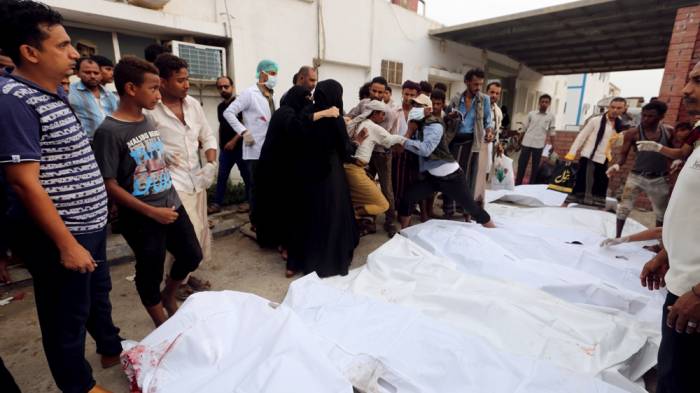At least 55 people, including women and children, have been killed in Yemen's Red Sea port city of Hodeidah in air raids carried out by a Saudi and UAE alliance battling Houthirebels, the rebel-run health ministry said.
In a statement issued late on Thursday, the ministry said the attacks, which targeted the city's Public al-Thawra Hospital and a busy fishing port, wounded at least 124 Yemenis.
The Reuters news agency put the death toll at 28 late on Thursday, while China's Xinhua said it stood at 70 early on Friday.
Taha al-Mutawakil, the Minister for Public Health and Population in the Houthi-led administration, said local authorities were struggling to cope with the number of casualties, and ambulances feared transporting the wounded to Sanaa or other provinces due to fears of being targeted by air attacks.
The International Red Cross, which supports the al-Thawra hospital, said it sent surgical supplies that will be enough to treat up to 50 patients who are in critical condition.
"What we have seen in Hodeidah is a heinous crime," Mutawakil was quoted by the Houthi-run SABA news agency saying.
He added that US shared responsibility for the deaths.
With logistical support from the US, Saudi Arabia and the UAE have been carrying out attacks inside Yemen since March 2015 in an attempt to reinstate the internationally recognised government of President Abu-Rabbu Mansour Hadi.
At least 10,000 people have been killed in the fighting and more than 100,000 children have died from extreme hunger and starvation.
For the last few weeks, the UN had been trying to broker a deal in a bid to avert an assault on the city, which it fears would further hinder Yemenis' access to food, fuel and medicine - worsening the world's most urgent humanitarian crisis.
Hodeidah has been under the control of the Houthis since 2014, and was responsible for delivering 70 percent of Yemen's imports - mostly humanitarian aid, food and fuel - pre-2015.
'Body parts scattered'
Mohamed al-Hasni, the head of Hodeidah's fishermen union, told Al Jazeera that there were no military targets in the area and "the targeting of fishermen was not expected".
"The port and market were full of people. It was a massacre," he said.
"There was no military presence in the area. No armed men were around at all. The targeting was aimed at spreading fear and terror.
Fatik al-Rodaini, a charity worker at Mona Relief, an aid group that operates in hard-to-reach areas of the country, said two civilians, one of whom was seeking medical treatment after being injured in the fish market raid, was among the fatalities.
Al Jazeera's Mohammed Adow, reporting from neighbouring Djibouti, said "rescue workers told journalists how they saw body parts all over the fish market that was the target of the air attacks.
"The fish market is just 20 metres away from the al-Thawra hospital, which is one of the handful of medical facilities that are still operational in Hodeidah."
Adow added that authorities in Hodeidah said these air attacks "were largely unexpected because both the Houthi fighters and the Saudi-UAE alliance had announced that they were going to cease hostilities in and around the port of Hodeidah to give UN peace efforts a chance".
Colonel Turki al-Malki, the alliance's spokesman, told the Saudi-owned Al Arabiya satellite news channel that it did not carry out the attacks and its military campaign "follows a strict and transparent approach based on the rules international law".
However, in June alone, the Saudis and UAE carried out at least 258 air raids on Yemen, nearly a third of which targeted non-military sites.
The Yemen Data Project listed 24 air raids on residential areas, three on water and electricity sites, three targeting hitting healthcare facilities, and one targeting an IDP camp.
The spokesman for the Saudi-UAE alliance did not respond to Al Jazeera's request for comment.
Peace talks proposed
Meanwhile, Martin Griffiths, the UN special envoy for Yemen, announced on Thursday he was inviting the warring sides for talks in the Swiss city of Geneva, in the latest bid to end the devastating civil war.
Griffiths, who is the third to take on the task of bringing an end to hostilities in the Arab world's poorest nation, cautioned that the situation for millions of Yemeni civilians could worsen if a solution was not reached within a reasonable timeframe.
"[It has been] two years since the last round in Kuwait so my principal message and request to this council today is that we urge the parties to resolve this conflict through negotiation rather than through military means," he said.
Al Jazeera's Rosiland Jordan, reporting from the UN headquarters in New York, said that Griffiths was not trying to address a specific hotspot in the Yemeni conflict but was rather looking for a comprehensive peace settlement and restore a "semblance of normality for the millions of Yemenis who have been living under a very brutal civil war for the past several years".
"Does this mean it's going to be a one time and they are going to find an actual political solution? Probably not but there is a real sense that this is the moment to try to get both sides back into some sort of conversation about ending their political gripes."
Al Jazeera
More about: Houthi
















































